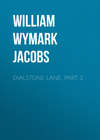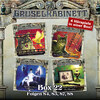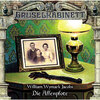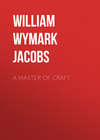Buch lesen: «Dialstone Lane, Part 3»
CHAPTER IX
The church bells were ringing for morning service as Mr. Vickers, who had been for a stroll with Mr. William Russell and a couple of ferrets, returned home to breakfast. Contrary to custom, the small front room and the kitchen were both empty, and breakfast, with the exception of a cold herring and the bitter remains of a pot of tea, had been cleared away.
"I've known men afore now," murmured Mr. Vickers, eyeing the herring disdainfully, "as would take it by the tail and smack'em acrost the face with it."
He cut himself a slice of bread, and, pouring out a cup of cold tea, began his meal, ever and anon stopping to listen, with a puzzled face, to a continuous squeaking overhead. It sounded like several pairs of new boots all squeaking at once, but Mr. Vickers, who was a reasonable man and past the age of self-deception, sought for a more probable cause.
A particularly aggressive squeak detached itself from the others and sounded on the stairs. The resemblance to the noise made by new boots was stronger than ever. It was new boots. The door opened, and Mr. Vickers, with a slice of bread arrested half-way to his mouth, sat gazing in astonishment at Charles Vickers, clad for the first time in his life in new raiment from top to toe. Ere he could voice inquiries, an avalanche of squeaks descended the stairs, and the rest of the children, all smartly clad, with Selina bringing up the rear, burst into the room.
"What is it?" demanded Mr. Vickers, in a voice husky with astonishment; "a bean-feast?"
Miss Vickers, who was doing up a glove which possessed more buttons than his own waistcoat, looked up and eyed him calmly. "New clothes—and not before they wanted'em," she replied, tartly.
"New clothes?" repeated her father, in a scandalized voice. "Where'd they get'em?"
"Shop," said his daughter, briefly.
Mr. Vickers rose and, approaching his offspring, inspected them with the same interest that he would have bestowed upon a wax-works. A certain stiffness of pose combined with the glassy stare which met his gaze helped to favour the illusion.
"For once in their lives they're respectable," said Selina, regarding them with moist eyes. "Soap and water they've always had, bless'em, but you've never seen'em dressed like this before."
Before Mr. Vickers could frame a reply a squeaking which put all the others in the shade sounded from above. It crossed the floor on hurried excursions to different parts of the room, and then, hesitating for a moment at the head of the stairs, came slowly and ponderously down until Mrs. Vickers, looking somewhat nervous, stood revealed before her expectant husband. In scornful surprise he gazed at a blue cloth dress, a black velvet cape trimmed with bugles, and a bonnet so aggressively new that it had not yet accommodated itself to Mrs. Vickers's style of hair-dressing.
"Go on!" he breathed. "Go on! Don't mind me. What, you—you—you're not going to church?"
Mrs. Vickers glanced at the books in her hand—also new—and trembled.
"And why not?" demanded Selina. "Why shouldn't we?"
Mr. Vickers took another amazed glance round and his brow darkened.
"Where did you get the money?" he inquired.
"Saved it," said his daughter, reddening despite herself.
"Saved it?" repeated the justly-astonished Mr. Vickers. "Saved it? Ah! out of my money; out of the money I toil and moil for—out of the money that ought to be spent on food. No wonder you're always complaining that it ain't enough. I won't 'ave it, d'ye hear? I'll have my rights; I'll–"
"Don't make so much noise," said his daughter, who was stooping down to ease one of Mrs. Vickers's boots. "You would have fours, mother, and I told you what it would be."
"He said that I ought to wear threes by rights," said Mrs. Vickers; "I used to."
"And I s'pose," said Mr. Vickers, who had been listening to these remarks with considerable impatience—"I s'pose there's a bran' new suit o' clothes, and a pair o' boots, and 'arf-a-dozen shirts, and a new hat hid upstairs for me?"
"Yes, they're hid all right," retorted the dutiful Miss Vickers. "You go upstairs and amuse yourself looking for'em. Go and have a game of 'hot boiled beans' all by yourself."
"Why, you must have been stinting me for years," continued Mr. Vickers, examining the various costumes in detail. "This is what comes o' keeping quiet and trusting you—not but what I've 'ad my suspicions. My own kids taking the bread out o' my mouth and buying boots with it; my own wife going about in a bonnet that's took me weeks and weeks to earn."
His words fell on deaf ears. No adjutant getting his regiment ready for a march-past could have taken more trouble than Miss Vickers was taking at this moment over her small company. Caps were set straight and sleeves pulled down. Her face shone with pride and her eyes glistened as the small fry, discoursing in excited whispers, filed stiffly out.
A sudden cessation of gossip in neighbouring doorways testified to the impression made by their appearance. Past little startled groups the procession picked its way in squeaking pride, with Mrs. Vickers and Selina bringing up the rear. The children went by with little set, important faces; but Miss Vickers's little bows and pleased smiles of recognition to acquaintances were so lady-like that several untidy matrons retired inside their houses to wrestle grimly with feelings too strong for outside display.
"Pack o' prancing peacocks," said the unnatural Mr. Vickers, as the procession wound round the corner.
He stood looking vacantly up the street until the gathering excitement of his neighbours aroused new feelings. Vanity stirred within him, and leaning casually against the door-post he yawned and looked at the chimney-pots opposite. A neighbour in a pair of corduroy trousers, supported by one brace worn diagonally, shambled across the road.
"What's up?" he inquired, with a jerk of the thumb in the direction of Mr. Vickers's vanished family.
"Up?" repeated Mr. Vickers, with an air of languid surprise.
"Somebody died and left you a fortin?" inquired the other.
"Not as I knows of," replied Mr. Vickers, staring. "Why?"
"Why?" exclaimed the other. "Why, new clothes all over. I never see such a turn-out."
Mr. Vickers regarded him with an air of lofty disdain. "Kids must 'ave new clothes sometimes, I s'pose?" he said, slowly. "You wouldn't 'ave'em going about of a Sunday in a ragged shirt and a pair of trowsis, would you?"
The shaft passed harmlessly. "Why not?" said the other. "They gin'rally do."
Mr. Vickers's denial died away on his lips. In twos and threes his neighbours had drawn gradually near and now stood by listening expectantly. The idea of a fortune was common to all of them, and they were anxious for particulars.
"Some people have all the luck," said a stout matron. "I've 'ad thirteen and buried seven, and never 'ad so much as a chiney tea-pot left me. One thing is, I never could make up to people for the sake of what I could get out of them. I couldn't not if I tried. I must speak my mind free and independent."
"Ah! that's how you get yourself disliked," said another lady, shaking her head sympathetically.
"Disliked?" said the stout matron, turning on her fiercely. "What d'ye mean? You don't know what you're talking about. Who's getting themselves disliked?"
"A lot o' good a chiney tea-pot would be to you," said the other, with a ready change of front, "or any other kind o' tea-pot."
Surprise and indignation deprived the stout matron of utterance.
"Or a milk-jug either," pursued her opponent, following up her advantage. "Or a coffee-pot, or—"
The stout matron advanced upon her, and her mien was so terrible that the other, retreating to her house, slammed the door behind her and continued the discussion from a first-floor window. Mint Street, with the conviction that Mr. Vickers's tidings could wait, swarmed across the road to listen.
Mr. Vickers himself listened for a little while to such fragments as came his way, and then, going indoors, sat down amid the remains of his breakfast to endeavour to solve the mystery of the new clothes.
He took a short clay pipe from his pocket, and, igniting a little piece of tobacco which remained in the bowl, endeavoured to form an estimate of the cost of each person's wardrobe. The sum soon becoming too large to work in his head, he had recourse to pencil and paper, and after five minutes' hard labour sat gazing at a total which made his brain reel. The fact that immediately afterwards he was unable to find even a few grains of tobacco at the bottom of his box furnished a contrast which almost made him maudlin.
He sat sucking at his cold pipe and indulging in hopeless conjectures as to the source of so much wealth, and, with a sudden quickening of the pulse, wondered whether it had all been spent. His mind wandered from Selina to Mr. Joseph Tasker, and almost imperceptibly the absurdities of which young men in love could be capable occurred to him. He remembered the extravagances of his own youth, and bethinking himself of the sums he had squandered on the future Mrs. Vickers—sums which increased with the compound interest of repetition—came to the conclusion that Mr. Tasker had been more foolish still.
It seemed the only possible explanation. His eye brightened, and, knocking the ashes out of his pipe, he crossed to the tap and washed his face.
"If he can't lend a trifle to the man what's going to be his father-in-law," he said, cheerfully, as he polished his face on a roller-towel, "I shall tell 'im he can't have Selina, that's all. I'll go and see 'im afore she gets any more out of him."
He walked blithely up the road, and, after shaking off one or two inquirers whose curiosity was almost proof against insult, made his way to Dialstone Lane. In an unobtrusive fashion he glided round to the back, and, opening the kitchen door, bestowed a beaming smile upon the startled Joseph.
"Busy, my lad?" he inquired.
"What d'ye want?" asked Mr. Tasker, whose face was flushed with cooking.
Mr. Vickers opened the door a little wider, and, stepping inside, closed it softly behind him and dropped into a chair.
"Don't be alarmed, my lad," he said, benevolently. "Selina's all right."
"What d'ye want?" repeated Mr. Tasker. "Who told you to come round here?"
Mr. Vickers looked at him in reproachful surprise.
"I suppose a father can come round to see his future son-in-law?" he said, with some dignity. "I don't want to do no interrupting of your work, Joseph, but I couldn't 'elp just stepping round to tell you how nice they all looked. Where you got the money from I can't think."
"Have you gone dotty, or what?" demanded Mr. Tasker, who was busy wiping out a saucepan. "Who looked nice?"
Mr. Vickers shook his head at him and smiled waggishly.
"Ah! who?" he said, with much enjoyment. "I tell you it did my father's 'art good to see 'em all dressed up like that; and when I thought of its all being owing to you, sit down at home in comfort with a pipe instead of coming to thank you for it I could not. Not if you was to have paid me I couldn't."
"Look 'ere," said Mr. Tasker, putting the saucepan down with a bang, "if you can't talk plain, common English you'd better get out. I don't want you 'ere at all as a matter o' fact, but to have you sitting there shaking your silly 'ead and talking a pack o' nonsense is more than I can stand."
Mr. Vickers gazed at him in perplexity. "Do you mean to tell me you haven't been giving my Selina money to buy new clothes for the young'uns?" he demanded, sharply. "Do you mean to tell me that Selina didn't get money out of you to buy herself and 'er mother and all of 'em— except me—a new rig-out from top to toe?"
"D'ye think I've gone mad, or what?" inquired the amazed Mr. Tasker. "What d'ye think I should want to buy clothes for your young'uns for? That's your duty. And Selina, too; I haven't given 'er anything except a ring, and she lent me the money for that. D'ye think I'm made o' money?"
"All right, Joseph," said Mr. Vickers, secretly incensed at this unforeseen display of caution on Mr. Tasker's part. "I s'pose the fairies come and put'em on while they was asleep. But it's dry work walking; 'ave you got such a thing as a glass o' water you could give me?"
The other took a glass from the dresser and, ignoring the eye of his prospective father-in-law, which was glued to a comfortable-looking barrel in the corner, filled it to the brim with fair water and handed it to him. Mr. Vickers, giving him a surly nod, took a couple of dainty sips and placed it on the table.
"It's very nice water," he said, sarcastically.
"Is it?" said Mr. Tasker. "We don't drink it ourselves, except in tea or coffee; the cap'n says it ain't safe."
Mr. Vickers brought his eye from the barrel and glared at him.
"I s'pose, Joseph," he said, after a long pause, during which Mr. Tasker was busy making up the fire—"I s'pose Selina didn't tell you you wasn't to tell me about the money?"
"I don't know what you're driving at," said the other, confronting him angrily. "I haven't got no money."
Mr. Vickers coughed. "Don't say that, Joseph," he urged, softly; "don't say that, my lad. As a matter o' fact, I come round to you, interrupting of you in your work, and I'm sorry for it—knowing how fond of it you are—to see whether I couldn't borrow a trifle for a day or two."
"Ho, did you?" commented Mr. Tasker, who had opened the oven door and was using his hand as a thermometer.
His visitor hesitated. It was no use asking for too much; on the other hand, to ask for less than he could get would be unpardonable folly.
"If I could lay my hand on a couple o' quid," he said, in a mysterious whisper, "I could make it five in a week."
"Well, why don't you?" inquired Mr. Tasker, who was tenderly sucking the bulb of the thermometer after contact with the side of the oven.
"It's the two quid that's the trouble, Joseph," replied Mr. Vickers, keeping his temper with difficulty. "A little thing like that wouldn't be much trouble to you, I know, but to a pore man with a large family like me it's a'most impossible."
Mr. Tasker went outside to the larder, and returning with a small joint knelt down and thrust it carefully into the oven.
"A'most impossible," repeated Mr. Vickers, with a sigh.
"What is?" inquired the other, who had not been listening.




















